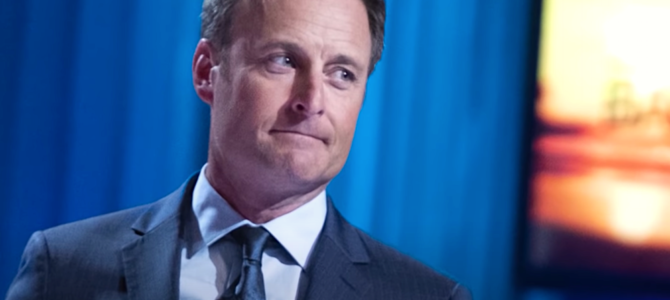
Chris Harrison has spoken. Weeks after his departure from “The Bachelor” over controversial comments, the longtime host broke his silence in an exclusive interview with Michael Strahan on “Good Morning America”. But it left us with more questions than answers and underscored just how egregious the whole incident was and continues to be.
Harrison, who has become synonymous with “The Bachelor” franchise after hosting every season of it and its spinoff shows since its inception nearly two decades ago, became the top news story and a victim of cancel culture several weeks ago. He was interviewed by Rachel Lindsay, a former bachelorette and the franchise’s first black lead.
Things went south, literally and figuratively, when Lindsay asked Harrison for comment on an ongoing controversy about one of this season’s contestants, Rachael Kirkconnell. Somebody had dug up college photos of Kirkconnell — a front-runner in this “Bachelor” season, which features the first black male lead — dressed up at an antebellum era-inspired party.
Harrison replied that until we hear what Kirkconnell has to say — she has since apologized — “we all need to have a little grace, a little understanding, a little compassion” rather than letting the “woke police” do the “judge, jury, and executioner thing” online. Of course, corporate entertainment media spun the whole 14-minute interview as if Harrison had said racism several years ago was A-OK, which is quite a gross representation of his sentiments. All Harrison did was talk back to cancel culture, and he got canceled for it.
Harrison issued an apology online that read like a hostage letter and stepped away from hosting, at least for the finale, but it seems he has no plans to give up his post. “I plan to be back, and I want to be back,” Harrison told Strahan. “There is much more work to be done, and I am excited to be part of that change.”
Harrison Is Now in a Struggle Session
His desperate desire to keep his job might explain why we saw Harrison, once a self-assured and respectable man, now lies prostrate at the feet of the “woke police” he warned about, begging for forgiveness, understanding, and employment. The transformation in Harrison’s persona between who we’ve seen on TV for years, including in his interview with Lindsay, and his “Good Morning America” appearance is absolutely staggering.
In his allegedly racist interview with Lindsay, Harrison sounded like a natural and gracious guy handling a tough conversation as many normal people would, including representing many Americans’ views on cancel culture and the online outrage mob.
Harrison’s interview with Strahan, however, was pitiful. It carried the same hostage undertones as his Instagram apology. In his robotic demeanor, if not in his words, Harrison conveyed he was doing whatever it took to keep his job, including reading off a script that betrayed his principles as he groveled for forgiveness in his PR voice. Harrison is in a 21st-century American struggle session.
Don’t take my word for it. Note the differences between the two versions of Harrison below:
Identity Politics Rule the Chris Harrison Debate
Even if Harrison were principled enough to keep standing up to the mob, his situation is worsened by the identity politics that reigns over it all. Harrison, a white person, was questioned about another white person’s actions by Lindsay, a popular black woman; replaced in his role at least temporarily by Emmanuel Acho, who is also black; grilled over the authenticity of his apology by Strahan, another black man — all within the context of the series’ first black bachelor and under the censure of the season’s so-called “people of color.”
If one racial group has a monopoly on the truth due to their varied experiences, which was implied by the fact that Harrison’s attempts even to engage in a conversation about the merits of Kirkconnel’s racism charge resulted in condemnation, how is Harrison or anyone else supposed to apologize or debate or communicate whatsoever across racial lines?
Hollywood and the media have a way of feigning credibility on cancel culture and stripping it from the perspectives they seek to silence. They do this not by allowing one idea to contend with another idea through debate, but by making a person they view as an oppressor answer to somebody they can prop up as a representative of the oppressed. As is the case with Strahan, Acho, and Lindsay, many of these token victims are incredibly successful.
What should be an important discussion about plantation parties and social media conduct based on Kirkconnell’s choices has now been reduced to the “Chris Harrison controversy” and an apology tour in which the disgraced host cannot possibly win. In capitulating, however, he’s proving he doesn’t deserve to.
Cancel Culture Is ‘Diabolical’
“I believe that mistake doesn’t reflect who I am or what I stand for,” Harrison told Strahan as the “Bachelor” host caved to the mob, forgetting that what he had actually said was gracious and, in our cultural climate, courageous. “I am deeply sorry. I’m sorry to Rachel Lindsay, and I’m sorry to the black community. … I am not a victim here. I made a mistake, and I own that. Racism, oppression — these are big, dynamic problems, and they take serious work, and I am committed to that work.”
Harrison, Strahan noted, is working with a “race educator and strategist, along with faith leaders and scholars like Dr. Michael Eric Dyson.”
Strahan and the rest of those who think as he does, however, would do well to heed some words from Dyson on cancel culture. “For the most part, cancel culture is a lateral move,” the professor and author told James Corden in December. “We’re beating up on each other. We’re mad at somebody making a mistake … but trying to do the right thing, a faux pas, and then we hold them accountable and we eviscerate them, we evaporate them, we disappear them — and I don’t think that’s right. All of us are human beings who are tending to make mistakes.”
“We live now in just a world of extremes,” Corden replied. “So how do you even begin to talk about forgiveness when even broaching the subject of forgiveness may lead to your own cancellation?”
“That’s an excellent point,” Dyson said. “And that’s why I find it to be so destructive. It’s so diabolical.”
Cancel culture is diabolical. It’s evil. And standing up to it is all Chris Harrison was trying to do. Rather than stand again when he got clobbered, however, Harrison has chosen to fold in the hopes of gaining favor from the thought police.
Even if he keeps his job, which remains to be seen, he will have lost his integrity and his principles, his most valuable assets. I cheered Harrison when he talked back to the mob, but this is just pathetic.








